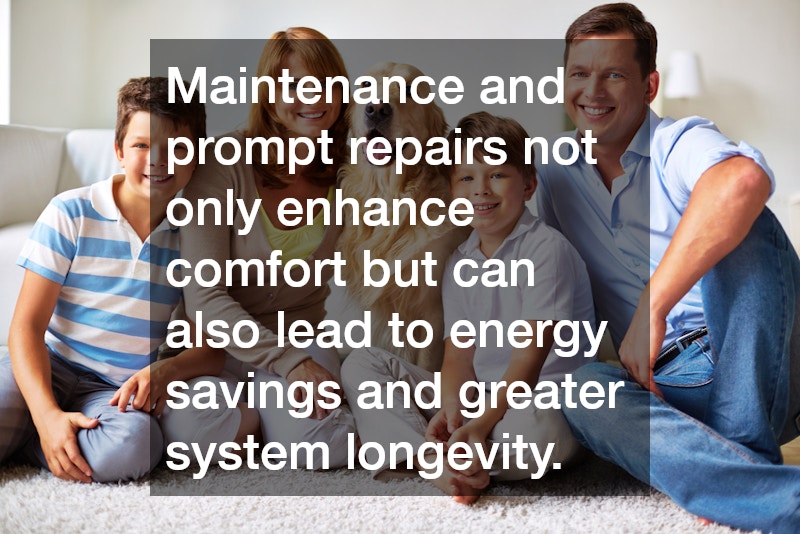In this article, we will explore the five most common reasons homeowners find themselves reaching for the phone to call an HVAC company. Understanding these common concerns can help you know when to seek professional assistance, ensuring your heating, ventilation, and air conditioning systems remain in optimal condition. Maintenance and prompt repairs not only enhance comfort but can also lead to energy savings and greater system longevity.
Why is My HVAC System Not Heating/Cooling Properly?
Clogged Filters or Vents
Clogged filters or blocked vents can severely affect the performance of an HVAC system, restricting airflow and making it harder for the system to maintain the desired temperature. When airflow is compromised, the HVAC unit must work harder, which not only reduces its efficiency but also increases energy consumption.
Regularly checking and replacing filters, as well as ensuring that vents are not obstructed, can prevent these issues and keep your system running smoothly.
Homeowners often overlook the importance of clean filters, not realizing that clogged filters can cause unnecessary strain on the system. This strain can lead to diminished performance and increased energy bills, making it imperative to maintain a regular cleaning schedule. Addressing blocked vents is equally important, as furniture or curtains might inadvertently block airflow, causing uneven temperatures throughout the home.
Practically, monitoring and maintaining clean filters and clear vents is a simple and effective way to ensure your HVAC system operates efficiently. Expert advice from an HVAC professional can guide you in properly maintaining your system, extending its life and functionality. Timely intervention by calling an HVAC company can help diagnose and fix more complex problems before they escalate.
Thermostat Issues
A malfunctioning thermostat can lead to heating or cooling problems, manifesting as inconsistent temperatures or a system that fails to turn on or off appropriately. Often underestimated, the thermostat is an essential component that communicates your comfort preferences to the HVAC unit. Identifying whether the thermostat is at fault involves checking the settings, calibration, and connectivity with the HVAC system.
Homeowners may notice signs indicating a thermostat issue, such as incorrect temperature readings or apparent delays in response to adjustments. If the thermostat is unresponsive or requires frequent resetting, it might be time to seek a professional assessment. Upgrading to a programmable or smart thermostat can enhance energy efficiency and provide more precise control over your home’s climate.
Why is My HVAC System Making Unusual Noises?
Squealing or Screeching Sounds
Squealing or screeching noises are often indicative of worn-out belts or motor bearings within the HVAC system. Over time, the wear and tear on these moving parts can lead to audible signs of mechanical distress. Listening for these noises and responding swiftly can prevent further damage to the system and ensure that it continues to operate effectively.
A persistent squeal could mean that the belt has slipped or needs replacement, which requires professional attention to avoid a complete equipment breakdown. Similarly, if motor bearings are the issue, ignoring them can lead to motor failure and expensive repairs. An HVAC technician can assess the situation, replace or adjust components, and provide maintenance advice to prevent future occurrences.
Routine maintenance and inspections can help identify the early signs of belt or bearing wear, allowing you to replace parts before they fail entirely. An experienced HVAC company can provide the necessary expertise to keep your system in peak condition. Calling in professionals to handle such issues is essential to avoid compounding problems that could compromise comfort and safety.
Banging or Clanking Sounds
Banging or clanking sounds may suggest loose or broken components within the HVAC system, such as a detached fan blade or a failed blower wheel. These noises can lead to more severe damage if not addressed quickly, as loose parts can cause vibrations that affect other system components. A professional evaluation can determine the exact cause and provide the necessary repairs to stabilize the system.
Ignoring these sounds increases the risk of parts breaking free and causing extensive damage, potentially resulting in a more comprehensive system failure and higher repair costs. Often, such noises signify underlying issues that require further exploration by a skilled HVAC technician. Alerting an HVAC professional to these noises can save time and money, preventing the escalation of minor issues into major concerns.
In conclusion, being aware of common HVAC issues, such as poor heating or cooling performance and unusual noises, is essential for maintaining the system’s efficiency and reliability. Understanding when to call a professional can save on energy costs, reduce the risk of unexpected breakdowns, and enhance the comfort of your home environment. With proper maintenance and timely intervention from a reputable HVAC company, these problems can be minimized, ensuring your system’s longevity and efficiency.
.

